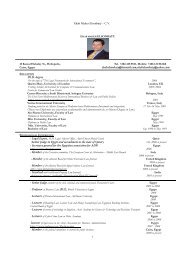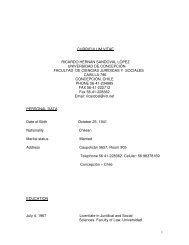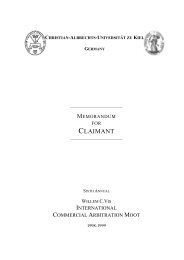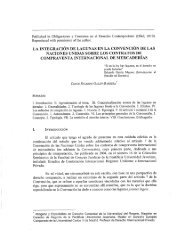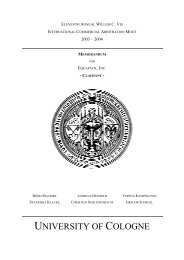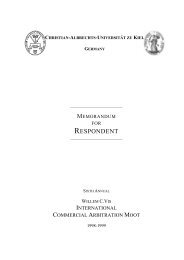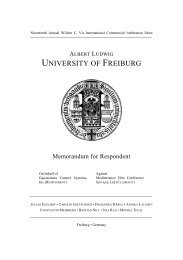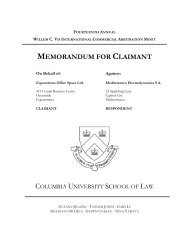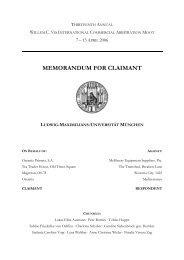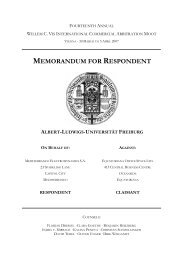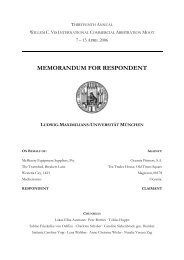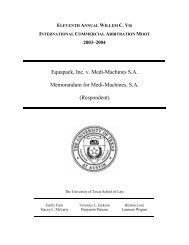MEMORANDUM FOR RESPONDENT - Pace University
MEMORANDUM FOR RESPONDENT - Pace University
MEMORANDUM FOR RESPONDENT - Pace University
Create successful ePaper yourself
Turn your PDF publications into a flip-book with our unique Google optimized e-Paper software.
QUEEN’S UNIVERSITY FACULTY OF LAW<br />
[Cook/Garcia 145; Lew et al. 236; McIlwrath/Savage 257; Moses 125] and improves the efficiency and<br />
legitimacy of the arbitral process as a whole [Paulsson 13].<br />
8. The Parties, and not the Council, are in the best position to determine the suitability of potential<br />
arbitrators [Born 1366, 1382]. Parties to an arbitration have a unique understanding of the<br />
particularities of their dispute and the qualities their arbitrators should possess. For this reason,<br />
administering institutions rarely deny appointments [Born 1407]. Here, the Parties were<br />
unequivocal in their endorsement of Mr. Y [Ltrs. of 26 and 27 July 2010]; thus, the Council should<br />
defer to their agreement. Party autonomy is the basis of international commercial arbitration<br />
[Ashford 81; Redfern/Hunter 315; Böckstiegel 25] and an administering institution should only<br />
overrule the parties’ choice in exceptional circumstances. These circumstances do not exist here.<br />
9. The Council should only exercise its discretion when the appointed arbitrator is so unsuitable<br />
that his or her presence on the tribunal poses a significant danger of rendering an award<br />
unenforceable or bringing the arbitral proceedings into disrepute. An institution’s role in<br />
confirming arbitrators is to ensure a minimum standard of independence and impartiality [Lew et<br />
al. 237; Gaillard/Savage 552], to preserve the reputation of the arbitral institution [Bühring-Uhle et<br />
al. 2006 35] and to ensure efficient administration of the proceedings [Gaillard/Savage 483;<br />
Zuberbühler et al. 48]. Given the primacy of party autonomy in arbitration, an institution should<br />
not step beyond that role. The integrity of the arbitral process is undermined not only by the<br />
appointment of unsuitable arbitrators, but also where the administering institution improperly<br />
overrules the parties’ agreement. Here, the Council should defer to the Parties’ acceptance of a<br />
presiding arbitrator unless an arbitrator is patently unsuitable. Indeed, there is no evidence that<br />
Mr. Y’s relationship with Claimant was so improper that the Parties could not waive it.<br />
3. The Council should have regard for the Parties’ expectations and should have<br />
applied the IBA Guidelines to confirm Mr. Y.<br />
10. The Council should have applied the IBA Guidelines to confirm Mr. Y. The Council referred to<br />
the IBA Guidelines in the letter informing Mr. Y of his appointment [Ltr. 15 July 2010]. This<br />
reference shows the Council intended to rely on, or at least consider, the IBA Guidelines when<br />
determining if Mr. Y would be confirmed. Furthermore, this reference created a reasonable<br />
expectation by the Parties that the IBA Guidelines would be applied. Institutions should respect<br />
not just the letter of the applicable rules, but also the reasonable expectations of the parties<br />
[Leaua in Klausegger et al. 110]. The IBA Guidelines have been widely accepted as the standard for<br />
determining independence and impartiality in international arbitration [Blackaby et al. 270;<br />
McIlwrath/Savage 246; Rozas in Fernández-Ballesteros/Arias 417]. Accordingly, the Council, although<br />
not formally bound by the IBA Guidelines, should have applied them to confirm Mr. Y.<br />
4



